 CENTRAL ENGLAND: Mike Wheeler's concert reviews from Nottingham and Derbyshire feature high profile artists on the UK circuit - often quite early on their tours.
CENTRAL ENGLAND: Mike Wheeler's concert reviews from Nottingham and Derbyshire feature high profile artists on the UK circuit - often quite early on their tours.
A Fine Balance between Funny and Sad
MIKE WHEELER reports from the Buxton Festival on 'The Land of Might-Have-Been'
In 2019, Buxton Festival had a runaway success with a new show in the tradition of an eighteenth-century pasticcio - drawing on numbers from several pre-existing scores by various composers - centred on the figure of Georgiana, Duchess of Devonshire, resident of famous nearby landmark, Chatsworth House.
Now comes a follow-up, also with a book by Festival CEO Michael Williams, in a joint production with Norwich Theatre. It focuses on a more recent local figure, one-time Buxton resident Vera Brittain, author of the moving WW1 memoir Testament of Youth.
Most of the score draws on songs by Ivor Novello, taken largely from hit shows such as The Dancing Years, King's Rhapsody and Glamorous Night, many with new lyrics, also by Williams. The unstoppably talented Iain Farrington has contributed a couple of additional numbers, the skilfully arranged short overture, and all the orchestrations, which remove the sentimental varnish the songs have acquired over the years, and give them a new lease of life - Buxton Opera House, Buxton, UK, 7 July 2023.
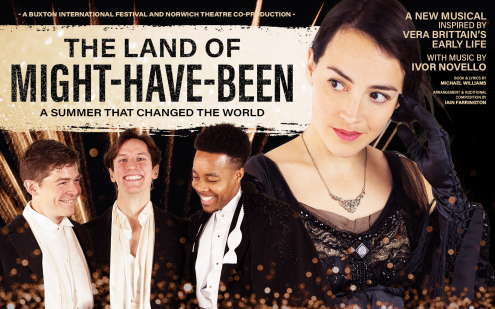
Poster for The Land of Might-Have-Been
The main action is framed by a Prologue and Epilogue set in London in 1944. We meet the older Brittain making a public speech against the bombing of German cities, being heckled by bystanders, and taken to task by George Orwell, no less, working as a journalist. A heckler angrily throws a copy of her book at her, and in one of the show's most touching moments, a soldier standing nearby picks it up and courteously hands it to her.
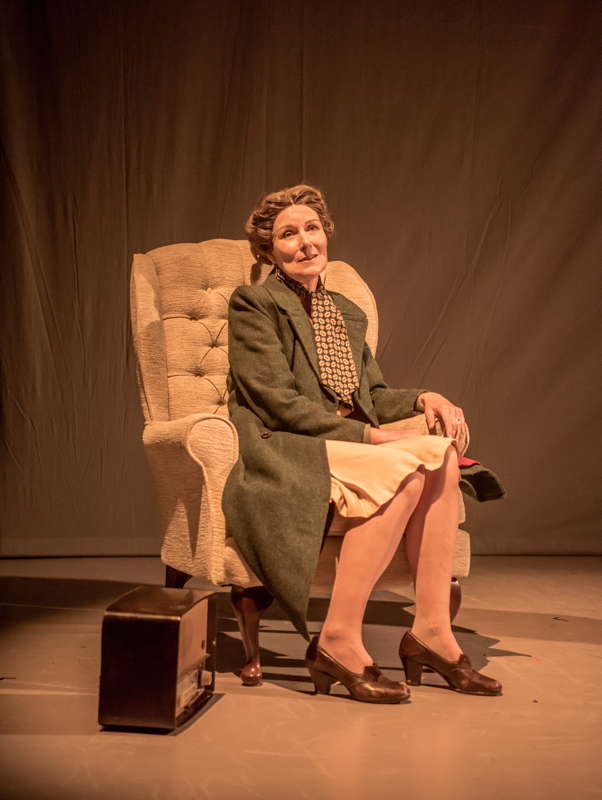
Elin Davies as the older Vera Brittain.
Photo © 2023 Genevieve Girling
The twenty-year-old Vera then joins her, and we wind back to Buxton in 1914. In Act I, she is being prepared by her parents for 'coming out' as a debutante. Determined not to take on the role expected of her, and dreading an insignificant future, she has her heart set on a place at Oxford University, which her father dismisses as nonsense.
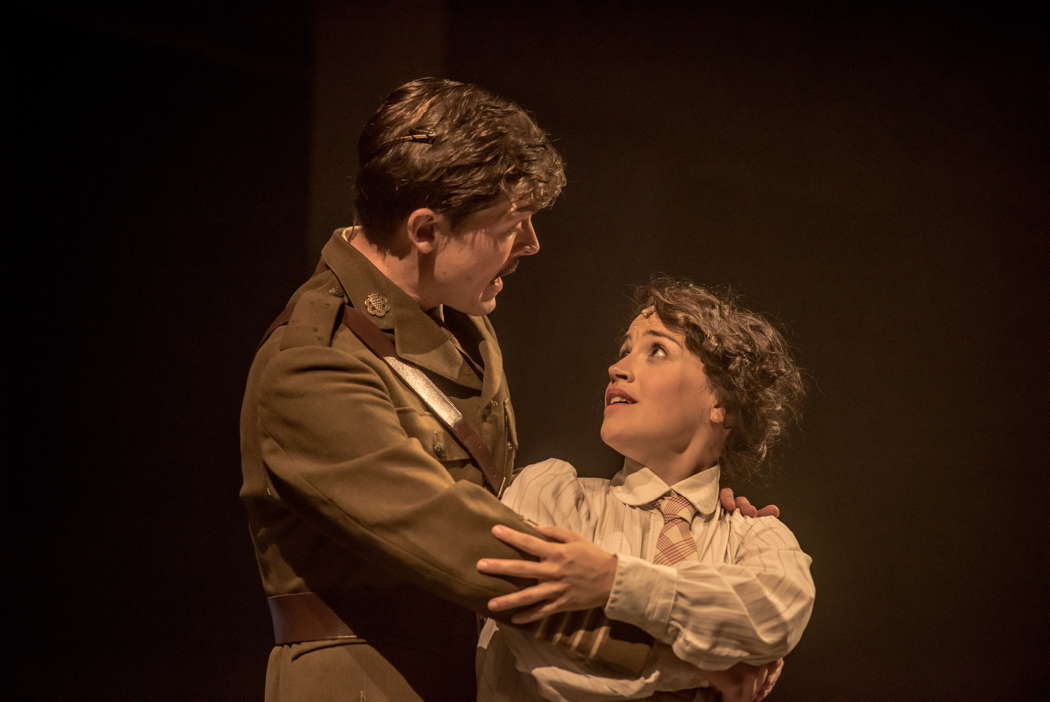
Alexander Knox as Roland Leighton and Audrey Brisson as Vera Brittain. Photo © 2023 Genevieve Girling
We meet the three people closest to her - her brother, Edward, Roland Leighton, later her fiancé, and Bobbie Jones, an invented character, gradually revealed to be Edward's gay lover.
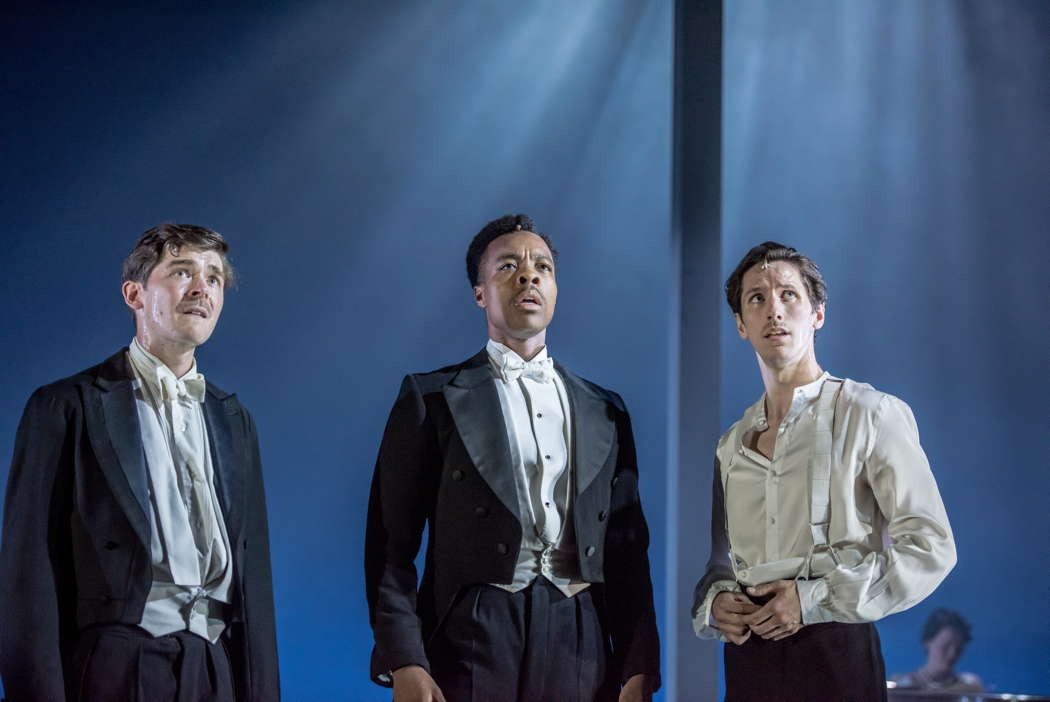
From left to right: Alexander Knox as Roland Leighton, Kit Esuruoso as Bobbie and George Arvidson as Edward Brittain. Photo © 2023 Genevieve Girling
A picnic cements their relationships, but they can't ignore the brewing war. Act I ends with music-hall star Vesta Tilley, in uniform, heading a show intended to boost recruitment (echoing a similar scene in Funny Girl), and the three men join up.
Act II begins on New Year's Eve, 1914, with imminent partings giving the celebrations a bitter-sweet taste. We watch the four friends as they negotiate their separations, via letters and such meetings as they can arrange. In a lighter moment, they explore Vera and Roland's misfortune in having to conduct their courtship always with a chaperone present, making witty use of Novello's 'And her mother came too'. But the darkness isn't sanitised. The show's title-song, with its original lyric, is a poignant duet for Edward and Bobbie. Later, Vera puts Oxford on hold to train as a nurse.
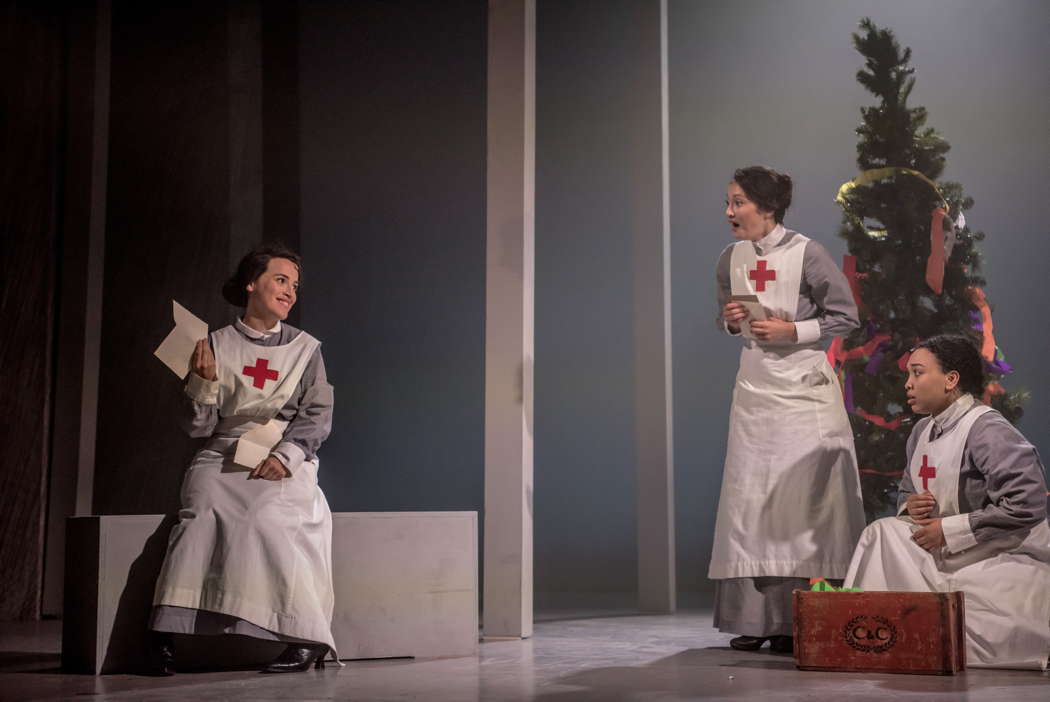
From left to right: Audrey Brisson as Vera Brittain, with Julia Mariko and Rachel Seirian as nurses. Photo © 2023 Genevieve Girling
At the front, Bobbie's commanding officer gives him a stark warning that his love-letters to Edward inevitably go through the official censor, with dire implications. And it's no spoiler to say that the three men don't survive.
The Epilogue returns us to 1944. Vera comes home to her daughter - the future distinguished politician Shirley Williams, to whom the show is dedicated - who has been reading her memoir, and expresses support for her principled stand. Vera looks back to 1914, and the events that first brought the four friends together, then tore them apart.
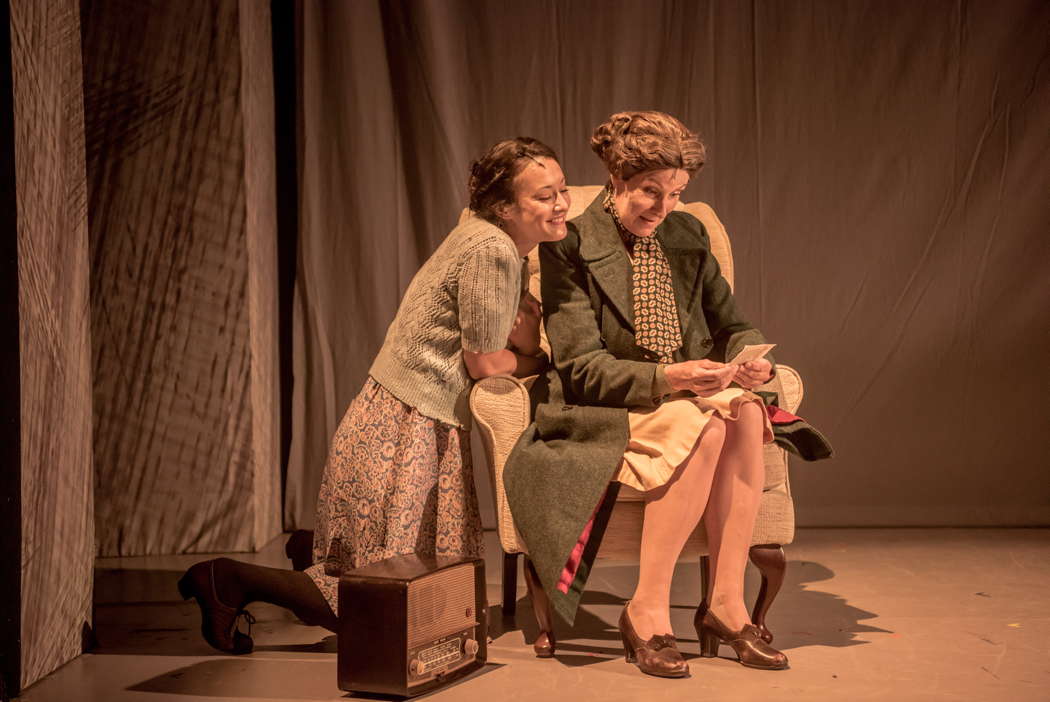
Julia Mariko as Shirley (left) and Elin Davies as the older Vera Brittain. Photo © 2023 Genevieve Girling
'We'll gather lilacs' is kept in reserve for the finale, as the cast reassembles. Here the show rather overplays its hand, in a big finish, where a simple quartet would have been more effective, perhaps with the other characters silent at the back of the stage. And a reprise of the Act I showstopper 'Buxton Ragtime Band' - one of Farrington's additional songs - as an up-tempo play-out number further detracts from the effect.
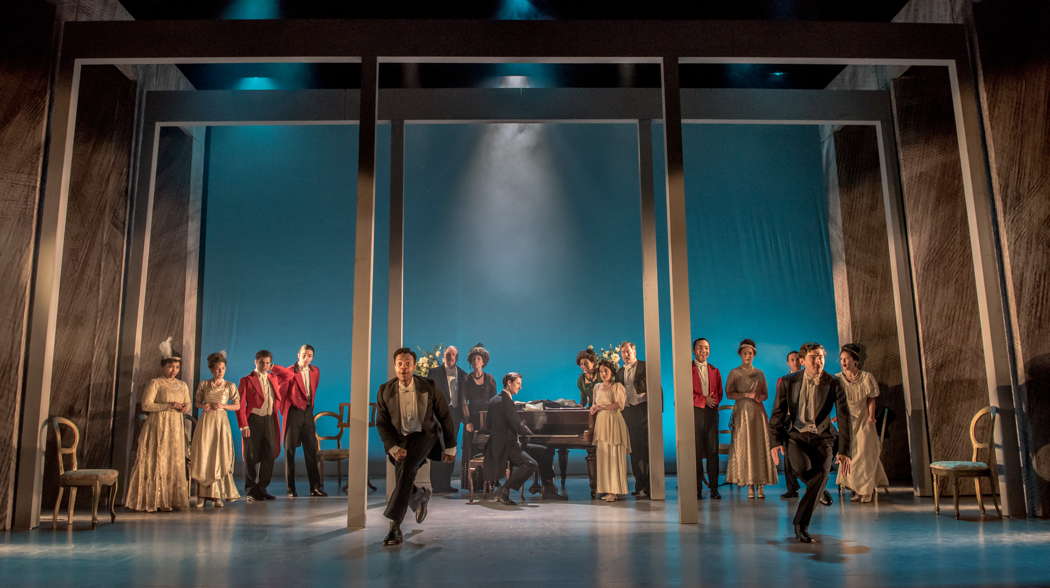
The Land of Might-Have-Been - full cast. Photo © 2023 Genevieve Girling
As the young Vera, Audrey Brisson develops convincingly from ingénue to more experienced figure, though her singing voice has something of a sharp edge at times. Her breakdown after the news of Roland's death is powerful without being melodramatic. George Arvidson's Edward and Alexander Knox's Roland offer contrasting studies in youthful idealism, the one puppyish, the other more reserved. Edward's developing relationship with Kit Esuruoso's wary, restrained Bobbie is sensitively drawn, helping anchor the show in the social mores of the time.
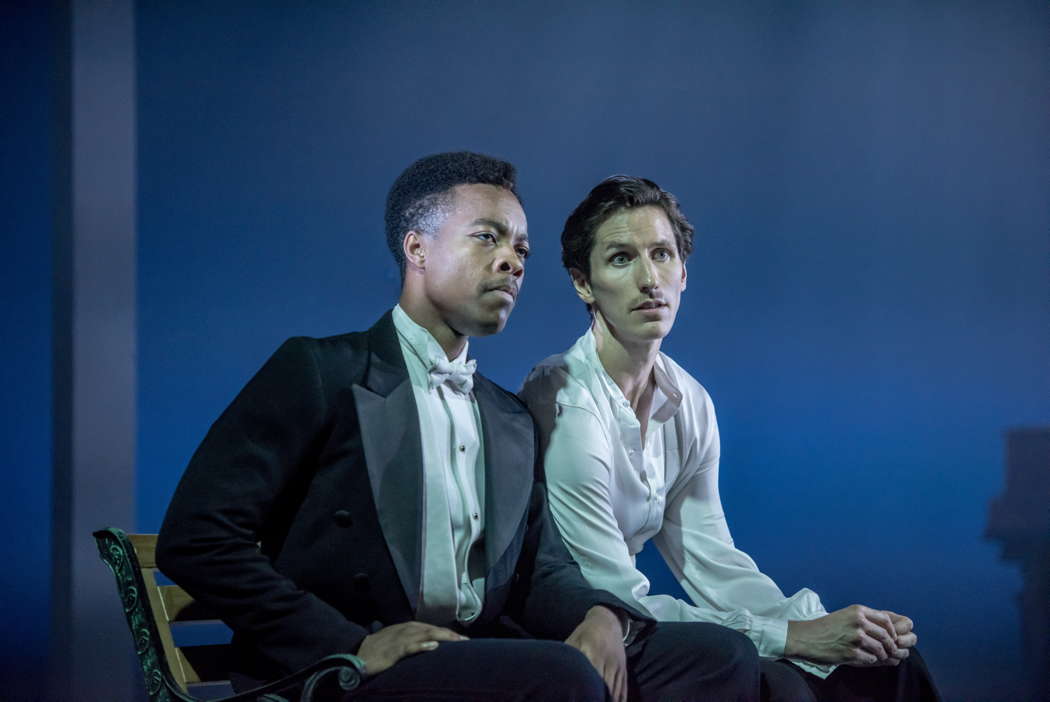
Kit Esuruoso as Bobbie (left) and George Arvidson as Edward Brittain. Photo © 2023 Genevieve Girling
As Vera and Edward's parents, Stuart Pendred and Bernadine Pritchett tend a little towards caricature in Act I. Julia Mariko plays Shirley, in the Epilogue, rather too young for a fourteen-year-old. Rachel Seirian gives Vesta Tilley just the right amount of showbiz bravado.
With Iwan Davies conducting, the Northern Chamber Orchestra plays with all the pizzaz of a West-End pit-band. Director Kimberley Sykes paces the action well, though an emotional breathing-space is needed between the end of Act II and the Epilogue. Nicky Shaw's designs keep the stage admirably uncluttered, with plenty of room for Michela Meazza's inventive choreography.
Reservations aside, The Land of Might-Have-Been strikes a fine balance between funny and sad, which it delivers with panache and conviction. And do you know what? I think I've been underestimating Ivor Novello all these years.
Copyright © 15 July 2023
Mike Wheeler,
Derby UK




